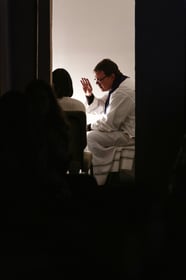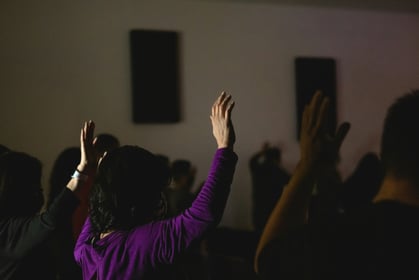One of my biggest fears one year ago was to have to self-isolate for 14 days.
Anyone who knows me knows I don’t usually like being on my own indoors all day. People are important to me. Being able to drive into work every day and interact with colleagues has become key for my overall well-being and grounding.
Lo and behold, I came into contact with someone who had COVID-19 and was told by a public health nurse that I had to quarantine at home for 14 days.
By day two I was bored and annoyed with spending so much time by myself. I became critical and felt I couldn’t do anything right.
Then came a turning point where I decided to stop judging myself and to surrender every movement of my soul to God and let him take care of everything.
I think I’ve been given a special grace from God to surrender and live in the present moment like never before. I feel time itself has slowed down for me and I’m on some sort of retreat. My relationship with time is different, and because I’m more calm and relaxed time feels more full and satisfying.
On my seventh day of quarantine I finished C.S. Lewis’ book Till We Have Faces. It has been a providential read during this time because of the depth of the book’s message and the extra down-time I have for reflection.
In the book, Orual, the Queen, complains that the gods never speak to her directly, but only in mysterious riddles. Through the process of writing a book about it, she realizes the gods aren’t able to speak to her face to face and clearly because she isn’t willing to show her true face.
In this story, having a face is a metaphor for knowing yourself: the good, the limitations, the weaknesses, the desires, and owning up to it, being sincere with yourself, others and God. This time of retreat, silence, and solitude has been for me a discovering and owning up to my own face in the light of God’s love.
I have found myself complaining to God before about his not being clear about his will in my life. I’ve wished he’d just speak to me clearly about what he wants me to do or not to do.
I realize that it’s not so much that God doesn’t speak. It’s more that I’m either ashamed to show my true face or afraid to own up to who I really am viz a viz God with all my desires, limitations, needs, and imperfections. This fear or lack of owning up to who and what I really am can create a barrier that doesn’t let me hear or see God clearly in my life.
We can only have genuine conversations in the spirit of truth; and with God, if we don’t come before him as we truly are, how can we receive and reflect his truth and beauty?
There are sides of this truth that can be difficult to muster: the fact that we are not God, we are not the masters of life and death, our lives are not in our hands.; the truth of our sinfulness, our pettiness, the many limitations of our minds, souls and bodies.
It can also be hard to accept our desires and needs, especially when they are not being met. How can we integrate all of these things and face God?
In the theme of Till We Have Faces, I think our life journey is one of coming to terms with who we are and who God is, and learning to embrace this reality with joy, gratitude, and love.
I imagine it would be hard or impossible to fully enjoy heaven if we can’t show our face as it truly is, if we can’t own up to who we truly are. How can we see God face to face if we don’t have a face?
To surrender to God we must possess what we are surrendering. If I surrender to him my will, my limitations, my sinfulness, the more I’m aware of and take responsibility for these, the greater the surrender. The clearer my yes, the clearer my face.
Once we surrender to God, in whose being mercy and justice are the same, he can and will do wonders with my soul. Once I surrender my vices, my woundedness, and my gifts to him, he will make my face beautiful. He will make me more human, more real, more fully alive, since this is what I was created for.
In another of C.S. Lewis’ books, The Great Divorce, there was a man who was afraid that if he let go of his vices and addictions he would become less of a man. He would become less real, less himself. I think many of us fear that if we surrender fully to God and the Holy Spirit guiding us in our innermost heart, we will become less free, less human, and less ourselves.
St. Therese of Lisieux offers inspiration for all who are afraid to take the leap of trust and surrender. She was a woman with a face. She knew very well her littleness before God, and therefore expected everything from him. She was so aware of her smallness and of God’s merciful love for her that she lived joyfully surrendered in the present moment to him.
Because of this clear knowledge of herself and of God’s power and love, she could say, “It is not because I have been preserved from mortal sin that I lift up my heart to God in trust and love. I feel that even had I on my conscience every crime one could commit, I should lose nothing of my confidence: my heart broken with sorrow, I would throw myself into the Arms of my Saviour. I know that he loves the Prodigal Son, I have heard his words to St. Mary Magdalen, to the woman taken in adultery, and to the woman of Samaria. No one could frighten me, for I know what to believe concerning his Mercy and his Love. And I know that all that multitude of sins would disappear in an instant, even as a drop of water cast into a flaming furnace.”
Owning up to the truth or our smallness and limitations doesn’t make us less human or less lovable. It is the necessary starting point for a genuine relationship with God.
He loves us infinitely and has so much he’d like to give us. He doesn’t need perfect people. He needs honest people willing to surrender to him, willing to show their true faces.




